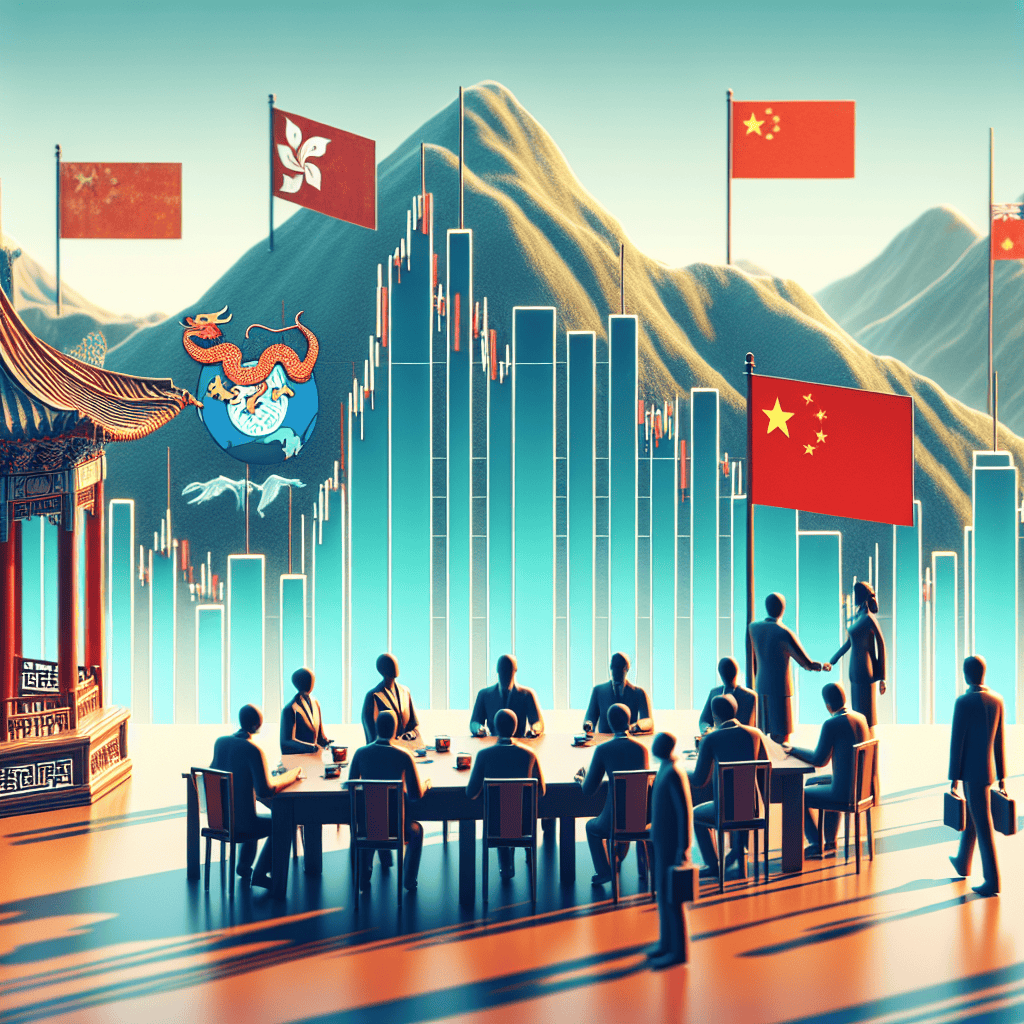“Market Jitters: Hong Kong Stocks Tumble as Trump Vote Lead Shakes Asia”
Introduction
In the wake of early voting results indicating a lead for Donald Trump in the U.S. presidential election, Asian markets experienced a downturn, with Hong Kong stocks notably dragging the region’s performance. Investors, reacting to the potential implications of a Trump presidency on global trade and economic policies, exhibited caution, leading to a sell-off in equities. The Hang Seng Index, a key benchmark for Hong Kong’s stock market, faced significant pressure as uncertainty loomed over future U.S.-China relations and the broader geopolitical landscape. This market response underscores the sensitivity of Asian economies to U.S. political developments and the interconnectedness of global financial systems.
Impact Of Political Events On Hong Kong Stock Market
The Hong Kong stock market, a significant barometer of economic sentiment in Asia, has recently experienced notable fluctuations, largely influenced by political events on the global stage. One such event that has had a profound impact is the early lead of Donald Trump in the U.S. presidential vote count. This development has sent ripples through financial markets worldwide, with Hong Kong stocks bearing a considerable brunt of the uncertainty.
Political events, particularly those involving major economies like the United States, often have far-reaching implications for global markets. The early lead of Trump in the vote count has introduced a degree of unpredictability, as investors grapple with the potential policy shifts that could arise from a Trump administration. Historically, Trump’s presidency was marked by a trade war with China, which had significant repercussions for Hong Kong, given its status as a major financial hub with deep economic ties to the mainland. Consequently, the prospect of renewed tensions has led to heightened caution among investors, contributing to the downward pressure on Hong Kong stocks.
Moreover, the Hong Kong stock market is particularly sensitive to geopolitical developments due to its unique position as a Special Administrative Region of China. The interplay between local and international politics can create a complex environment for investors. In this context, the early Trump vote lead has exacerbated existing concerns about the stability of U.S.-China relations. Investors are wary of potential policy changes that could affect trade, tariffs, and diplomatic relations, all of which have direct implications for Hong Kong’s economic landscape.
In addition to geopolitical factors, market sentiment is also influenced by the broader economic environment. The uncertainty surrounding the U.S. election results has coincided with ongoing challenges posed by the global pandemic, which continues to affect economic activity and investor confidence. The combination of these factors has created a volatile environment for Hong Kong stocks, as market participants weigh the potential risks and opportunities.
Furthermore, the reaction of Hong Kong stocks to political events underscores the interconnectedness of global financial markets. As investors seek to navigate the complexities of an evolving political landscape, they must also consider the broader implications for regional and global economies. The early Trump vote lead serves as a reminder of the intricate web of factors that influence market dynamics, highlighting the need for a nuanced understanding of both local and international developments.
In conclusion, the early lead of Donald Trump in the U.S. presidential vote count has had a discernible impact on the Hong Kong stock market, reflecting the broader influence of political events on financial markets. As investors continue to monitor the situation, the interplay between geopolitical developments and economic conditions will remain a key focus. The response of Hong Kong stocks to these events illustrates the challenges and opportunities that arise in a complex and interconnected global economy. As such, market participants must remain vigilant and adaptable, ready to respond to the shifting landscape of political and economic factors that shape the financial markets.
Analyzing The Volatility Of Asian Markets During U.S. Elections
The Asian financial markets have long been sensitive to the political and economic developments in the United States, given the intricate web of global trade and investment ties. During the U.S. elections, this sensitivity often translates into heightened volatility, as investors attempt to anticipate the potential impacts of a new administration on international relations and economic policies. In the recent election cycle, this phenomenon was particularly evident as Hong Kong stocks exerted a downward pressure on Asian markets amid an early lead by Donald Trump in the vote count.
As the election results began to trickle in, market participants across Asia were closely monitoring the developments, aware that the outcome could significantly influence global economic policies. The early lead by Trump, known for his unpredictable policy decisions and trade tensions with China, introduced a layer of uncertainty that investors were keen to navigate. This uncertainty was reflected in the performance of Hong Kong stocks, which are often seen as a barometer for broader Asian market sentiment due to the city’s status as a major financial hub.
Hong Kong’s Hang Seng Index experienced notable declines as investors reacted to the unfolding election scenario. The market’s response was driven by concerns over potential disruptions in U.S.-China relations, which could have far-reaching implications for trade and investment flows in the region. The specter of renewed trade tensions under a Trump administration loomed large, prompting investors to reassess their risk exposure and adjust their portfolios accordingly.
Moreover, the interconnectedness of global markets meant that the ripple effects of Hong Kong’s market movements were felt across Asia. Other major indices, such as Japan’s Nikkei and South Korea’s KOSPI, also experienced fluctuations as investors grappled with the implications of the U.S. election outcome. The volatility was further exacerbated by the fact that the election results were not immediately conclusive, prolonging the period of uncertainty and keeping markets on edge.
In addition to the direct impact of the U.S. election, other factors contributed to the volatility in Asian markets. The ongoing COVID-19 pandemic continued to cast a shadow over economic recovery prospects, with investors wary of potential setbacks in the fight against the virus. Furthermore, central banks in the region were closely monitoring the situation, ready to intervene if necessary to stabilize markets and support economic growth.
Despite the initial turbulence, it is important to note that markets are inherently resilient and capable of adjusting to new realities. As the election results became clearer and the prospect of a stable transition of power emerged, investor sentiment began to stabilize. This underscores the importance of maintaining a long-term perspective in the face of short-term volatility, as markets often recover once uncertainties are resolved.
In conclusion, the early lead by Donald Trump in the U.S. elections served as a catalyst for volatility in Asian markets, with Hong Kong stocks playing a pivotal role in shaping investor sentiment. The interconnected nature of global financial systems means that developments in one region can have far-reaching implications, underscoring the need for investors to remain vigilant and adaptable. As the dust settles, market participants will continue to assess the implications of the election outcome, balancing short-term reactions with long-term strategies to navigate the ever-evolving landscape of global finance.
Hong Kong Stocks: A Barometer For Global Political Uncertainty
In recent times, the financial markets have become increasingly sensitive to political developments, with Hong Kong stocks emerging as a significant barometer for global political uncertainty. As the world closely monitored the early lead of Donald Trump in the U.S. presidential vote, Asian markets, particularly Hong Kong, experienced notable fluctuations. This phenomenon underscores the intricate relationship between political events and market dynamics, highlighting the interconnectedness of global economies.
Hong Kong, a major financial hub in Asia, often reflects broader market sentiments due to its strategic position and open economy. The city’s stock market is particularly susceptible to geopolitical tensions and international political developments. As news of Trump’s early lead in the presidential race spread, investors reacted swiftly, leading to a downturn in Hong Kong stocks. This reaction was not isolated, as it reverberated across other Asian markets, indicating a regional apprehension towards potential shifts in U.S. policies that could impact trade and economic relations.
The sensitivity of Hong Kong stocks to political events can be attributed to several factors. Firstly, the city’s economy is heavily reliant on international trade and finance, making it vulnerable to changes in global economic policies. Secondly, the political landscape in Hong Kong itself is often influenced by external factors, including U.S.-China relations, which have been a focal point during Trump’s presidency. Consequently, any indication of a continuation of Trump’s policies could exacerbate existing tensions, prompting investors to adopt a cautious approach.
Moreover, the early lead of Trump in the vote raised concerns about the potential for increased volatility in global markets. During his previous tenure, Trump’s administration was characterized by unpredictable policy shifts and trade disputes, particularly with China. These factors contributed to a climate of uncertainty, which often led to market instability. As a result, investors in Hong Kong and across Asia were wary of a similar scenario unfolding, should Trump secure another term in office.
In addition to these concerns, the broader implications of a Trump presidency on global economic recovery efforts cannot be overlooked. The world is still grappling with the aftermath of the COVID-19 pandemic, and any disruption in international cooperation could hinder progress. Hong Kong, with its deep economic ties to both the U.S. and China, finds itself at the crossroads of these geopolitical dynamics. Therefore, the performance of its stock market serves as a reflection of investor sentiment towards the potential challenges and opportunities that lie ahead.
While the immediate reaction to Trump’s early lead was negative, it is essential to recognize that markets are inherently volatile and subject to rapid changes. As the election results continue to unfold, investors will likely reassess their positions based on the evolving political landscape. In this context, Hong Kong stocks will remain a critical indicator of market sentiment, providing valuable insights into how global political developments are perceived by investors.
In conclusion, the fluctuations in Hong Kong stocks amid Trump’s early vote lead highlight the profound impact of political uncertainty on financial markets. As a key player in the global economy, Hong Kong’s market reactions offer a glimpse into the broader implications of political events on investor confidence and economic stability. As the world navigates this complex landscape, the interplay between politics and markets will continue to shape the financial outlook for Hong Kong and beyond.
The Role Of U.S. Politics In Shaping Asian Financial Markets

The intricate relationship between U.S. politics and Asian financial markets has long been a subject of interest for economists and investors alike. This connection was particularly evident during the early stages of the U.S. presidential election when an unexpected lead by Donald Trump in the vote count sent ripples across global markets. Among the most affected were Hong Kong stocks, which experienced a notable downturn, underscoring the profound influence of American political developments on Asian economies.
To understand this phenomenon, it is essential to consider the interconnectedness of global financial systems. The United States, as the world’s largest economy, plays a pivotal role in setting the tone for international markets. Consequently, any significant political event in the U.S., such as a presidential election, can lead to heightened volatility and uncertainty in financial markets worldwide. This was precisely the case when early results indicated a potential Trump victory, causing investors to reassess their risk exposure and prompting a sell-off in Asian stocks.
Hong Kong, as a major financial hub in Asia, is particularly sensitive to shifts in global market sentiment. The city’s stock market, known for its openness and liquidity, often serves as a barometer for investor confidence in the region. Therefore, when Trump’s early lead became apparent, it triggered a wave of caution among investors, leading to a decline in Hong Kong stocks. This reaction was not merely a reflection of local economic conditions but rather a response to broader geopolitical concerns.
The potential implications of a Trump presidency on U.S.-China relations were at the forefront of investors’ minds. During his campaign, Trump had taken a hard stance on trade with China, threatening to impose tariffs and renegotiate trade agreements. Such policies, if implemented, could have far-reaching consequences for Asian economies that are heavily reliant on trade with the United States. As a result, the prospect of increased trade tensions contributed to the unease in Asian markets, with Hong Kong stocks bearing the brunt of the uncertainty.
Moreover, the impact of U.S. politics on Asian financial markets extends beyond immediate reactions to election results. The policies and decisions made by the U.S. administration can have long-term effects on global economic dynamics. For instance, changes in U.S. interest rates, fiscal policies, and regulatory frameworks can influence capital flows, exchange rates, and investment strategies in Asia. Therefore, investors closely monitor U.S. political developments to anticipate potential shifts in these areas.
In addition to trade and economic policies, geopolitical considerations also play a crucial role in shaping market sentiment. The U.S. has significant strategic interests in Asia, and its foreign policy decisions can affect regional stability and security. Consequently, any changes in U.S. leadership or policy direction can lead to adjustments in risk assessments by investors, further impacting Asian financial markets.
In conclusion, the early lead of Donald Trump in the U.S. presidential election serves as a poignant reminder of the intricate linkages between American politics and Asian financial markets. The reaction of Hong Kong stocks highlights the sensitivity of Asian economies to U.S. political developments, driven by concerns over trade, economic policies, and geopolitical stability. As global financial systems become increasingly interconnected, understanding these dynamics is crucial for investors seeking to navigate the complexities of international markets.
Investor Sentiment In Hong Kong Amid U.S. Election Results
Investor sentiment in Hong Kong has been notably impacted by the unfolding U.S. election results, particularly as early indications suggested a lead for Donald Trump. This development has cast a shadow over Asian markets, with Hong Kong stocks experiencing a downward trend. The interconnectedness of global markets means that political events in one region can have far-reaching implications elsewhere, and the U.S. presidential election is a prime example of this phenomenon. As investors in Hong Kong and across Asia closely monitor the election outcomes, the initial lead for Trump has introduced a degree of uncertainty and volatility into the market.
The reaction of Hong Kong stocks can be attributed to several factors. Firstly, the potential for a Trump victory raises questions about future U.S. foreign policy, trade relations, and economic strategies, all of which are critical to the global economic landscape. During his previous tenure, Trump’s administration adopted a more protectionist stance, leading to trade tensions with China. Given Hong Kong’s status as a major financial hub with strong ties to both the U.S. and China, any indication of renewed trade conflicts could have significant repercussions for its market.
Moreover, the uncertainty surrounding the election results has led to a cautious approach among investors. Markets generally prefer predictability and stability, and the prospect of a contested or prolonged election outcome can lead to increased market volatility. This is particularly true in the case of Hong Kong, where the local market is sensitive to external shocks due to its open economy and reliance on international trade. As a result, investors may be inclined to adopt a risk-averse strategy, pulling back from equities and seeking safer assets until a clearer picture emerges.
In addition to the immediate impact of the U.S. election, there are broader economic concerns that are influencing investor sentiment in Hong Kong. The ongoing challenges posed by the COVID-19 pandemic continue to weigh heavily on global markets. Despite efforts to contain the virus and stimulate economic recovery, uncertainties remain regarding the pace and sustainability of growth. This backdrop of economic fragility amplifies the impact of political developments, as investors are already navigating a complex and unpredictable environment.
Furthermore, the performance of Hong Kong stocks is also being shaped by domestic factors. The city’s political landscape has been marked by tensions and protests in recent years, contributing to an atmosphere of uncertainty. While the local government has taken steps to stabilize the situation, the potential for further unrest remains a concern for investors. This domestic uncertainty, combined with the external pressures from the U.S. election, creates a challenging environment for market participants.
In conclusion, the early lead for Trump in the U.S. election has introduced a layer of complexity to the investment landscape in Hong Kong. As investors grapple with the implications of potential shifts in U.S. policy and the broader economic context, Hong Kong stocks have been weighed down by a mix of caution and uncertainty. The situation underscores the intricate web of factors that influence global markets and highlights the importance of monitoring both international and domestic developments. As the election results continue to unfold, investors in Hong Kong and across Asia will remain vigilant, seeking to navigate the challenges and opportunities that lie ahead.
Comparative Analysis Of Hong Kong Stocks And Other Asian Markets
In the ever-evolving landscape of global financial markets, the performance of Hong Kong stocks often serves as a bellwether for broader Asian market trends. Recently, the Hong Kong stock market has been under significant pressure, a situation exacerbated by the early lead of Donald Trump in the U.S. presidential vote. This development has introduced a wave of uncertainty, not only affecting investor sentiment in Hong Kong but also casting a shadow over other Asian markets. To understand the comparative dynamics at play, it is essential to delve into the factors influencing Hong Kong stocks and how these elements resonate across the region.
Hong Kong’s stock market is uniquely positioned at the crossroads of East and West, making it particularly sensitive to geopolitical shifts and international economic policies. The early lead of Trump in the presidential vote has reignited concerns over potential shifts in U.S.-China relations, a factor that has historically impacted Hong Kong’s financial ecosystem. Investors, wary of possible trade tensions and policy changes, have reacted by pulling back, leading to a noticeable dip in stock prices. This cautious approach is not isolated to Hong Kong; it reverberates across Asia, where markets are closely interconnected.
In comparison, other major Asian markets such as Japan, South Korea, and China have shown varied responses to the unfolding political scenario in the United States. Japan’s Nikkei index, for instance, has demonstrated relative resilience, buoyed by a weaker yen which tends to benefit its export-driven economy. However, the overarching uncertainty has still led to a degree of volatility, as investors remain on edge about the potential for abrupt policy shifts that could affect global trade dynamics.
South Korea’s KOSPI index, on the other hand, has experienced fluctuations similar to those in Hong Kong, largely due to its own geopolitical sensitivities and economic ties with both the U.S. and China. The semiconductor sector, a significant component of South Korea’s market, is particularly vulnerable to changes in international trade policies, making it a focal point for investors during this period of uncertainty.
Meanwhile, China’s stock markets have shown a mixed response. While the Shanghai Composite Index has experienced some volatility, it has been somewhat cushioned by domestic economic policies aimed at stabilizing growth. The Chinese government’s focus on boosting internal consumption and technological innovation provides a buffer against external shocks, although the market remains susceptible to broader geopolitical developments.
In this context, the comparative analysis of Hong Kong stocks and other Asian markets highlights the intricate web of economic interdependencies and geopolitical factors that influence investor behavior. The early lead of Trump in the U.S. presidential vote serves as a reminder of the global nature of financial markets, where political developments in one region can have far-reaching implications across continents.
As investors navigate this complex landscape, the need for strategic diversification and risk management becomes increasingly apparent. While Hong Kong stocks currently weigh down the broader Asian market sentiment, the situation underscores the importance of understanding regional nuances and the potential for rapid changes in market dynamics. Ultimately, the interplay between local market conditions and global political developments will continue to shape the trajectory of Asian markets, necessitating a vigilant and informed approach to investment strategies.
Strategies For Navigating Hong Kong Stock Market Fluctuations During Political Events
In the ever-evolving landscape of global finance, the Hong Kong stock market stands as a pivotal player, often reflecting broader geopolitical dynamics. Recently, the market has been under pressure, particularly as early indications of a lead for Donald Trump in the U.S. presidential vote have emerged. This development has introduced a layer of uncertainty, prompting investors to reassess their strategies. Navigating the fluctuations of the Hong Kong stock market during such political events requires a nuanced understanding of both local and international factors.
To begin with, it is essential to recognize the interconnectedness of global markets. The Hong Kong stock market, being one of the most open and internationalized in Asia, is particularly sensitive to external political developments. The early lead of Trump in the U.S. elections has raised concerns about potential shifts in U.S. foreign policy, trade relations, and economic strategies, all of which could have significant implications for Hong Kong. Consequently, investors must remain vigilant, keeping a close eye on political developments and their potential impact on market sentiment.
Moreover, diversification emerges as a crucial strategy in mitigating risks associated with political volatility. By spreading investments across various sectors and asset classes, investors can reduce their exposure to any single market shock. In the context of Hong Kong, this might involve balancing investments between traditional sectors such as finance and real estate, and emerging industries like technology and green energy. This approach not only cushions against potential downturns but also positions investors to capitalize on growth opportunities in different sectors.
In addition to diversification, maintaining a long-term perspective is vital. Political events, while impactful, often have short-lived effects on market performance. Historical data suggests that markets tend to stabilize once the initial shock of political news subsides. Therefore, investors should avoid making impulsive decisions based on short-term market movements. Instead, they should focus on the underlying fundamentals of their investments, such as company performance, industry trends, and economic indicators, which are more reliable predictors of long-term success.
Furthermore, staying informed is paramount. In an era where information is abundant, discerning relevant and accurate data is crucial. Investors should rely on reputable sources for news and analysis, and consider consulting financial advisors who can provide expert insights tailored to their specific investment goals. By staying informed, investors can make more strategic decisions, adjusting their portfolios in response to evolving political and economic landscapes.
Additionally, employing hedging strategies can offer a layer of protection against market volatility. Instruments such as options and futures can be used to offset potential losses in the stock market. While these tools require a certain level of expertise, they can be effective in managing risk during periods of uncertainty. Investors should consider their risk tolerance and investment objectives when exploring these options, ensuring that their strategies align with their overall financial goals.
In conclusion, the Hong Kong stock market’s response to early indications of a Trump lead in the U.S. elections underscores the importance of strategic planning in navigating market fluctuations during political events. By embracing diversification, maintaining a long-term perspective, staying informed, and considering hedging strategies, investors can better manage the risks associated with political volatility. As the global financial landscape continues to evolve, these strategies will remain essential in ensuring resilience and success in the face of uncertainty.
Q&A
1. **What caused Hong Kong stocks to weigh down Asia?**
– Hong Kong stocks were affected by early indications of a lead for Donald Trump in the U.S. presidential election, causing market uncertainty.
2. **How did the early Trump vote lead impact Asian markets?**
– The early lead for Trump created volatility and uncertainty, leading to a decline in stock markets across Asia, including Hong Kong.
3. **Which sectors in Hong Kong were most affected?**
– Financial and property sectors were among the most affected due to concerns over potential policy changes and economic implications.
4. **What was the immediate reaction of investors in Hong Kong?**
– Investors reacted by selling off stocks, leading to a drop in the Hang Seng Index as they sought to mitigate risk amid uncertainty.
5. **How did currency markets respond to the early Trump vote lead?**
– The uncertainty led to fluctuations in currency markets, with safe-haven currencies like the Japanese yen seeing increased demand.
6. **Were there any other global markets affected by the early Trump vote lead?**
– Yes, global markets, including those in Europe and the U.S., experienced volatility as investors reacted to the unexpected election developments.
7. **What were analysts predicting for the Hong Kong market moving forward?**
– Analysts were cautious, suggesting that markets would remain volatile until there was more clarity on the U.S. election outcome and its potential impact on global trade and economic policies.
Conclusion
The early lead of Donald Trump in the U.S. presidential election has created uncertainty in global markets, leading to a downturn in Asian stocks, with Hong Kong equities experiencing significant pressure. Investors are reacting to the potential implications of a Trump presidency on international trade and economic policies, which could disrupt existing market dynamics. The volatility reflects broader concerns about geopolitical stability and economic growth, prompting a cautious approach among traders. As a result, the Hong Kong stock market, sensitive to global economic shifts, is bearing the brunt of this uncertainty, contributing to the overall decline in Asian markets.




